| Listing 1 - 10 of 30 | << page >> |
Sort by
|
Dissertation
Year: 1930 Publisher: Paris : M. Lac,
Abstract | Keywords | Export | Availability | Bookmark
 Loading...
Loading...Choose an application
- Reference Manager
- EndNote
- RefWorks (Direct export to RefWorks)
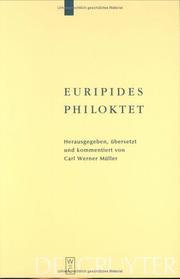
ISBN: 3110163489 9783110163483 3110808021 Year: 2000 Volume: 21 Publisher: Berlin ; New York, NY : Walter de Gruyter,
Abstract | Keywords | Export | Availability | Bookmark
 Loading...
Loading...Choose an application
- Reference Manager
- EndNote
- RefWorks (Direct export to RefWorks)
Greek drama (Tragedy) --- Tragédie grecque --- History and criticism --- Histoire et critique --- Euripides --- Philoctetes. --- Literatura grega (crítica e interpretação) --- Euripides. --- EurÍpedes --- Euripide, 480-406 av. J.-C. --- Criticism and interpretation. --- Literatura grega (crítica e interpretação). --- EurÍpedes, --- Tragédie grecque --- Philoctetes (Greek mythology) --- Mythology, Greek --- Ėvripid --- Yūrībīdīs --- Euripide --- Euripedes --- Eŭripido --- Eurypides --- Euripidesu --- אוריפידס --- エウリーピデース --- Εὐριπίδης
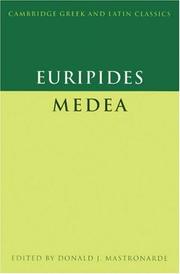
ISBN: 0521643864 0521643651 9780521643658 9780521643863 Year: 2002 Publisher: Cambridge, UK New York : Cambridge University Press,
Abstract | Keywords | Export | Availability | Bookmark
 Loading...
Loading...Choose an application
- Reference Manager
- EndNote
- RefWorks (Direct export to RefWorks)
Medea (Greek mythology) --- Euripide, --- Medea (Greek mythology) - Drama.
Book
ISBN: 9783110534023 3110534029 3110536188 3110537281 Year: 2017 Publisher: Berlin ; Boston : De Gruyter,
Abstract | Keywords | Export | Availability | Bookmark
 Loading...
Loading...Choose an application
- Reference Manager
- EndNote
- RefWorks (Direct export to RefWorks)
This is the first full-scale commentary on Euripides "Alexandros", which is one of the best preserved fragmentary tragedies. It yields insight into aspects of Euripidean style, ideology and dramatic technique (e.g. rhetoric, stagecraft and imagery) and addresses textual and philological matters, on the basis of a re-inspection of the papyrus fragments. This book offers a reconstruction of the play and an investigation of issues of characterization, staging, textual transmission and reception, not least because Alexandros has enjoyed a fascinating Nachleben in literary, dramaturgical and performative terms. It also contributes to the readers? understanding of the trends of later Euripidean drama, especially the dramatist's innovation and experimentation with plot-patterns and staging conventions. Furthermore, the analysis of Alexandros could stimulate a more comprehensive reading of the extant Trojan Women coming from the same production, which bears the features of a "connected trilogy". Thus, the information retrieved through the interrogation of the rich fragmentary material serves to supplement and contextualize the extant tragic corpus, showcasing the vitality and multiformity of Euripidean drama as a whole.
Euripides. --- Tragédie grecque --- Pâris --- Euripide --- Critique et interprétation. --- Greek drama. --- fragmentary plays. --- tragedy.
Book
ISBN: 9783110522556 3110522551 9783110523607 3110523604 9783110523591 3110523590 3110523418 Year: 2018 Publisher: Berlin : De Gruyter,
Abstract | Keywords | Export | Availability | Bookmark
 Loading...
Loading...Choose an application
- Reference Manager
- EndNote
- RefWorks (Direct export to RefWorks)
Aufgrund seiner Vielschichtigkeit gehört der Ion zu den am schwersten fassbaren Tragödien des Euripides. Theologie, Politik und Gattungsgesetze sind nur drei der Themen, die in der Forschung zu dieser Tragödie über einen ausgesetzten und wiedergefundenen athenischen Prinzen und Sohn des Apoll kontrovers diskutiert werden. Der vorliegende Kommentar liefert eine Neuedition des Textes zusammen mit detaillierten Erläuterungen, die auf sprachliche Schwierigkeiten ebenso eingehen wie auf literarische und dramaturgische Fragen. Ein besonderes Augenmerk liegt auf Elementen, durch die zeitgenössische soziale, rechtliche und poltische Ideen und Institutionen in die mythische Handlung integriert werden. Die Einleitung behandelt neben den großen interpretatorischen Problemen auch die Bearbeitung des Mythos durch Euripides, die Datierung und die Geschichte des Texts. So erhält die Diskussion des Stückes sowohl in den Einzelheiten als auch im Ganzen eine neue Grundlage.
Euripides. --- Ion (Euripides). --- Euripide (0480-0406 av. J.-C.). --- Euripide --- Electronic books. --- LITERARY CRITICISM / Ancient & Classical. --- Books in machine-readable form --- Digital books --- E-books --- Ebooks --- Online books --- Books --- Electronic publications --- Euripides --- Ėvripid --- Yūrībīdīs --- Euripedes --- Eŭripido --- Eurypides --- Euripidesu --- אוריפידס --- エウリーピデース --- Εὐριπίδης --- Greek drama. --- Ion. --- tragedy.
Book
ISBN: 9783110453386 9783110457384 3110457059 3110457385 311045338X 311045338X Year: 2020 Publisher: Berlin : De Gruyter,
Abstract | Keywords | Export | Availability | Bookmark
 Loading...
Loading...Choose an application
- Reference Manager
- EndNote
- RefWorks (Direct export to RefWorks)
Euripides’ Cyclops is presented here in a new prose translation that is faithful to the original text, accompanied by a detailed introduction on the author, the work, and historical context. The volume also includes an extensive linguistic and substantive commentary, which does not presuppose knowledge of the Greek language. In der Blütezeit der griechischen Tragödie musste jeder der drei Dramatiker, die an den Großen Dionysien, dem bedeutendsten Dionysosfest Athens, im Rahmen des Tragödienwettbewerbs um den Sieg kämpften, nicht nur drei Tragödien präsentieren, sondern auch ein heiteres Nachspiel, das nach den Satyrn, die immer den Chor bildeten, Satyrspiel hieß. Der Kyklops des Euripides ist das einzige vollständig erhaltene Exemplar dieser dramatischen Gattung. Das Stück behandelt die jedem Zuschauer aus der Odyssee wohlbekannte Begegnung des Odysseus mit dem Kyklopen Polyphem.
Dissertation
Year: 1933 Publisher: Paris : M. Vigné,
Abstract | Keywords | Export | Availability | Bookmark
 Loading...
Loading...Choose an application
- Reference Manager
- EndNote
- RefWorks (Direct export to RefWorks)
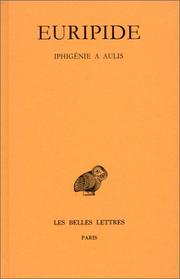
ISSN: 01847155 ISBN: 2251001271 2251004661 2251005102 3251004858 2251005021 2251004858 9782251001272 9782251004662 9782251005027 9782251005102 9782251004853 Year: 2003 Volume: 10, 32, 37, 44, 112, 139, 154, Publisher: Paris: Les Belles Lettres,
Abstract | Keywords | Export | Availability | Bookmark
 Loading...
Loading...Choose an application
- Reference Manager
- EndNote
- RefWorks (Direct export to RefWorks)
Classical Greek literature --- Iphigenia (Greek mythology) --- 880 --- #GOSA:VIII.Oud.EUR.O --- Drama --- Literature Greek and Classical literatures --- Mythology, Greek --- Drama. --- Euripides --- Translations into French. --- Mythologie grecque --- Théâtre --- Translations into French
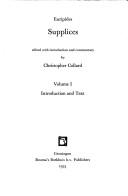
ISBN: 9060880463 9789060880463 Year: 1975 Publisher: Groningen: Bouma,
Abstract | Keywords | Export | Availability | Bookmark
 Loading...
Loading...Choose an application
- Reference Manager
- EndNote
- RefWorks (Direct export to RefWorks)
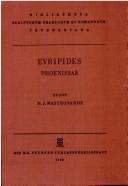
ISBN: 3322004619 9783322004611 Year: 1988 Volume: vol *279 Publisher: Leipzig: BSB B.G. Teubner Verlagsgesellschaft,
Abstract | Keywords | Export | Availability | Bookmark
 Loading...
Loading...Choose an application
- Reference Manager
- EndNote
- RefWorks (Direct export to RefWorks)
Classical Greek literature --- Seven against Thebes (Greek mythology) --- Sept contre Thèbes (Mythologie grecque) --- Drama --- Théâtre --- Euripides. --- Drama. --- -Drama --- Sept contre Thèbes (Mythologie grecque) --- Théâtre --- Seven against Thebes (Greek mythology) - Drama.
| Listing 1 - 10 of 30 | << page >> |
Sort by
|

 Search
Search Feedback
Feedback About UniCat
About UniCat  Help
Help News
News